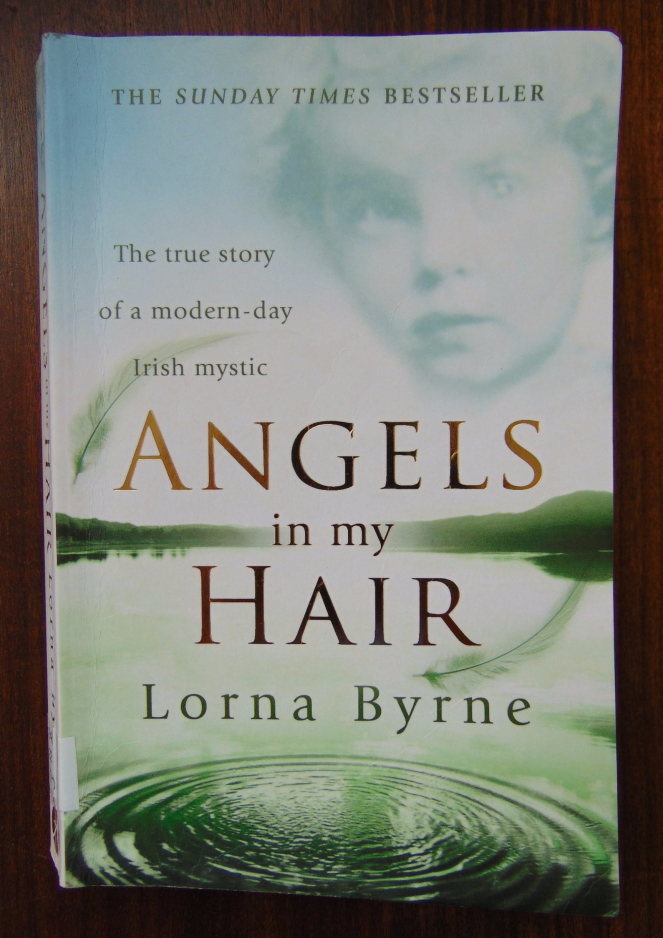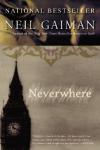I initially got this book out of the library for my dad, because he’s very interested in near-death experiences. This book is not really about that, although it does touch on the subject briefly.
Lorna Byrne is described on the cover as a modern-day Irish mystic, although I don’t think she would have used that sort of terminology herself before she wrote this book.
 “Angels in my hair” by Lorna Byrne (2008)
“Angels in my hair” by Lorna Byrne (2008)
Lorna Byrne was born in Dublin in 1953, and from the age of two was assumed to be retarded. She describes how, from very early childhood, she could see things that she later discovered other people couldn’t see. This preoccupation with beings outside the realm of other people’s existence led her family, and the doctor who made the pronouncement when she was two years old, to believe she wasn’t quite the full shilling.
At some point in her childhood she became aware that the supernatural beings she was interacting with were angels. She could also see the spirits of people who had died, such as her brother Christopher who had died at only 10 weeks old, before Lorna was born. Despite having died at such a young age, Christopher frequently appeared to Lorna as an older child, as well as sometimes looking like a baby.
Throughout her life, Lorna has been communicating with angels on a daily basis, and the matter-of-fact tone of the book suggests that she inhabits this supernatural world just as easily as she does the physical one.
My dad read the book eagerly and then encouraged me to read it, but no sooner had he finished it than my mum picked it up. They both seemed to enjoy it although they admitted they thought it was rather weird and full of strange ideas. I approached it with considerable scepticism, and assumed my cynicism would prevent me from getting beyond the first few pages. I told my dad I would give it a go, but doubted I would get very far.
To my astonishment I quickly became intrigued by Lorna’s story, from its early beginnings through to the death of her husband in the year 2000. I read the book over breakfast for several days, and found myself looking forward each morning to the next instalment.
There are several quotes at the front of the book, given by reviewers who felt much the same as I did about reading a book like this. The Sunday Independent had this to say:
“Before reading Lorna’s book, in my cynicism I saw her claims as psychobabble. But the book surprised me, I really enjoyed it. It’s a very simply and softly written narrative, one that managed to grip me emotionally and made me reflect.”
Another one, from Woman’s Weekly, simply said:
“You believe she is telling you the truth.”
This was the feeling I had when I finished the book. I am not aware of ever having seen angels, or indeed the spirits of dead people. I have not felt or heard what I would describe as an angel close to me, nor has it ever occurred to me that there might be angels with me at any time. Despite my own lack of experience in this department, I nevertheless felt that Lorna Bryne was telling me the truth, her truth.
I did wonder when I started reading the book if Lorna Byrne might have some sort of mental condition along the lines of schizophrenia, but the more I read the less I saw it like that. The impression I’ve been left with is that, in writing this book, Lorna Byrne has detailed the facts of her life as they appear to her. She uses words such as ‘angel’, ‘spirit’ and ‘soul’ to describe things that have happened to her, experiences she’s had that can’t be described in normal physical terms. I don’t see her as retarded, or mentally ill, but rather as someone who experiences life in a very different way from what I’m familiar with.
It could be said that she has an unusually fertile imagination, or that her vivid accounts suggest the results obtained by ingesting hallucinogenic substances, but there is a surprising simplicity about her narrative. She obviously feels entirely comfortable inhabiting what some would call a make-believe world, but I have no doubt that it’s very real to her.
Did she make all this up? Is there anything potentially believable about what she describes? Can anyone really see supernatural beings? Is her testimony in any way a proof that such beings might exist? I think each reader would have to form their own opinions about these questions, but I would challenge anyone who feels cynical to at least give this book a chance. It won’t be everyone’s cup of tea, and I’m sure there are many people even more cynical than I am who could never be persuaded to read beyond page 1, but I think a lot of people have been surprised, as I was, by how fascinating her story is.
Advertisements Share this:- More





